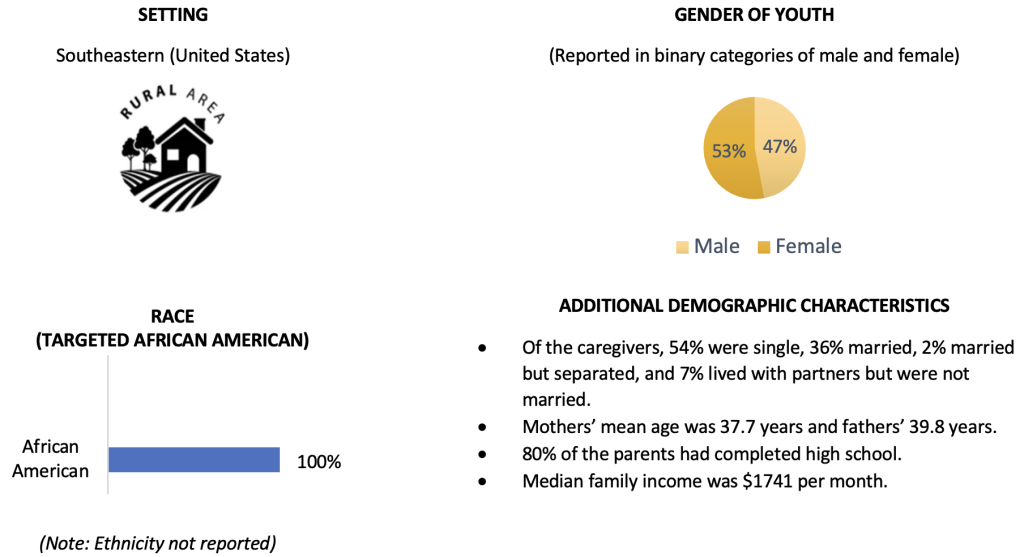Program Description: The Strong African American Families (SAAF) Program is a seven-session intervention designed for youth aged 10-14 and their caregivers. The goal of the program is to build the strengths of African American families and support parents and youth during the critical transition from early adolescence to the teen years with emphasis on helping young people avoid risky and dangerous behaviors, particularly substance use and sexual involvement.
Considering the unique strengths and stressors for African American families, especially the effects of discrimination, SAAF aims to 1) facilitate the development of a supportive and structured family environment that promotes positive parent-child relationships, (2) enhance parental engagement in parenting that involves high levels of monitoring and support, strong communication about risk behavior such as substance use and sex, and racial socialization, and (3) prepare youth to resist substance use and other risk behaviors by maintaining a future orientation, enhancing risk behavior resistance skills, and accepting parental influences.
The program is typically implemented over seven weeks and each of the seven sessions lasts two hours. During the first hour, participants meet in separate, concurrent teen and caregiver group sessions. During the second hour all of the families meet together for combined teen and caregiver activities. An optional component includes a meal prior to the start of each session to allow for communal experience and rapport building between facilitators and families. All sessions are led by African American community members trained in the SAAF curriculum.
Results: Blueprints has certified two related studies of the Strong African American Families Program.
Study 1: Brody et al. (2004, 2006) conducted a cluster randomized trial with 332 African American mothers and their 11-year-old children residing in eight rural Georgia counties. The sample consisted of the first cohort of an ongoing project (Study 2 below). Counties were randomly assigned to either the intervention (n=4 counties, 182 families) or control (n=4 counties, 150 families) conditions. Families in the control condition received three leaflets on adolescent development, stress management, and exercise. Mothers and children completed assessments at baseline, posttest, and 29-month follow-up. Compared with youth in the control condition, intervention youth reported significantly fewer risk behaviors (composite of drinking, marijuana use, and sexual intercourse) at posttest, and lower proportions of new alcohol users as well as slower rates of growth in alcohol use at long-term follow-up.
Study 2: Brody et al. (2008) used the same methods as Study 1 and expanded the sample to include a second cohort of families residing in the same Georgia counties. A total of 667 families (n=369 intervention, n=298 control) participated in the study and completed assessments at baseline, posttest, and 29-month follow-up. Youth in the intervention group reported significantly fewer conduct problems than their control counterparts at 29 months post-baseline.
Characteristics of Larger Study Sample (Cohorts 1 and 2) as Reported by Study Authors:

Cost-Benefits: To date, the Washington State Institute for Public Policy has not conducted a cost-benefit analysis of implementing Strong African American Families.
References:
Study 1:
Brody, G., McBride-Murry, V., Gerrard, G., Gibbons, F., Molgaard, V., McNair, L., . . . Neubaum-Carlan, E. (2004). The Strong African American Families program: Translating research into prevention programming. Child Development, 75(3), 900-917.
Brody, G. H., Murry, V. M., Kogan, S. M., Brown, A. C., Anderson, T., Chen, Y., . . . Wills, T. A. (2006). The Strong African American Families program: A cluster-randomized prevention trial of long-term effects and a mediational model. Journal of Consulting and Clinical Psychology, 74, 356-366.
Study 2:
Brody, G., Kogan, S., Chen, Y., & McBride-Murry, V. (2008). Long-term effects of the Strong African American Families program on youths’ conduct problems. Journal of Adolescent Health, 43, 474-481.
Read the Program Fact Sheet
